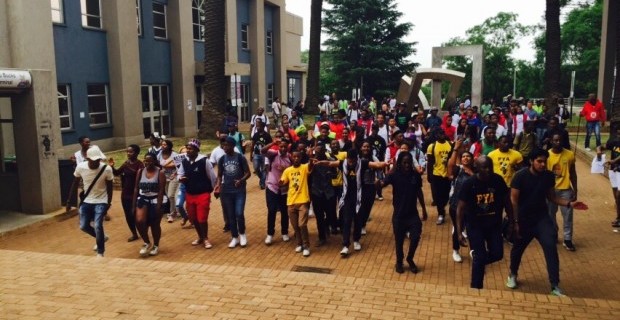Wits University’s Student Representative Council (SRC) has staged a major protest early Wednesday morning against the 10.5% fee increase slated for next year. The SRC and its supporters have blocked off certain entrances to the university, causing chaos on the roads around the campus, which is situated on the edge of the Johannesburg CBD.
Protestors, who blocked entrances to the university, shouted slogans like “Kill us but we are not moving!†to fellow students and members of the JMPD alike.
Those barred from entering campus parking areas abandoned their vehicles on the streets, opting instead to head into campus on foot and scuffles broke out between those protesting and those turning people away at the entrances.
The SRC has described the fee increases as a “deliberate and anti-progressive decision to once more entrench the financial exclusion of poor studentsâ€.
“Wits University is not a business and cannot be run in the interests of the minority. We are tired of the blatant lack of transparency and financial accountability on the part of the management,†it said in a release concerning the protest.
The protest has since moved into the East Campus and the Central Block building and the entrances at Station Street, Enoch Sontonga and Empire Road have reopened.
Protesting students have since been disrupting lectures and test venues to mobilise others to join an official protest in the Wits tunnel at which the students’ demands will be read out at midday.
One student, who was scheduled to write a test this afternoon, told reporter Pontsho Pilane that while she was not involved in the protest, she sympathises with the cause.
“I understand that the students feel there’s no other way [to resolve this] and I also believe there’s no other way. If they want to be taken seriously, disruption is the only way,†she said, adding that the fee increases were “ridiculousâ€.
“We’re not coping with fees as it is. It’s impossible to pay everything on time and Wits withholds your results if you don’t pay everything. As a result I couldn’t even apply for a bursary for next year because I don’t have [my academic] results,†she said.
Another student, who had been protesting since 6:30am, told Pilane while all students would be affected, it was poor students in particular who would suffer under the fee increase.
“Students are sleeping in libraries. They can’t afford accommodation. Students are eating droeg pap – dry pap, nothing just pap – just to sustain themselves day in, day out. This is unacceptable for [vice chancellor Adam Habib],†she said.
Senate House, where the university management is based, has been blocked off by Campus Control. All lectures and academic activities have been cancelled for the day.
In a statement released on Wednesday, the university’s chief financial officer, Linda Jarvis, said the fee rise had been influenced by:
- Â the approximately 22% fall in the rand-dollar exchange rate which affected the cost of resources like books and journals
- Â the 7% increase in academic staff salaries, which were based on a three year cycle
- generic inflation, which is currently around 6%, and
- the cost of utilities, which has been rising at a higher than inflation rate.
With an expected government subsidy increase of 5%, Jarvis said, the university had to “make up†its income in order to cover its expenditure and remain stable.
“These increases are unfortunately unavoidable but we are doing all that we can, especially at the national level to look at long-term solutions to resolve the issue of student funding,†she said.
Wits is not the only university currently facing a fees crisis. On Tuesday, Rhodes University vice-chancellor Sizwe Mabizela said universities were being forced to raise fees in order to cover their operational costs because of a funding shortfall from government. Earlier this year higher education minister Blade Nzimande said that the shortfalls are expected to continue until the economic situation in the country improves.
In a statement, Wits management said that while it recognised that students have a right to protest, this could not happen at the expense of the right to learn and work in a safe environment.
“The majority of our 32,500 students and 5,000 staff want to continue teaching, learning and preparing for the upcoming examinations. It is unacceptable for the majority of our staff and students to be held ransom by a minority. We will take the necessary action in line with our policies and procedures to create an environment that allows teaching and learning to continue,†it said.









